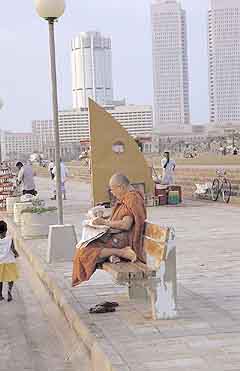SWEDISH SOUTH ASIAN STUDIES NETWORK
Report from meeting at National Science Foundation of Sri Lanka (NSF):
 Friday
1 March 2002.
Friday
1 March 2002.
We visited National Science Foundation, the state funded organisation
established in 1998, and residing at 47/5 Maitland Place, Colombo 7 (near
to the Swedish Embassy).
Website: www.nsf.ac.lk.
E-mail: info@nsf.ac.lk
SASNET had initially been invited for the meeting by the
former NSF director Eric Karunayake,
and the Director Mehan Watson.
We also had previous knowledge of the work performed at NSF from Professor
Malin Åkerblom, ISP, Uppsala University, who belongs to our
network (in her capacity as member of the reference group for SASNET planning
grants).
Arriving at the office building we first met the Director for Scientific Affairs, R M Wasantha Amaradasa, who made all necessary arrangements for us at place. We were then introduced to the new NSF Chairman Ranjan Ramasamy, Professor of Molecular Immunology (specialised on malaria research). Ramasamy, who has been working at Groningen University in the Netherlands, was appointed to the post, succeeding Eric Karunayake as recently as December 2001, after the latest parliamentary elections.
We had an introductory chat with Ramasamy, Watson, and Wasantha
at the Chairman´s office, after which we went to the well-equipped
auditorium of NSF where the meting was going to be held.
Around 20 people had come to listen to our presentation of SASNET and
the possibility of research co-operation between Swedish and Sri Lankan
scientists. Staffan gave a short overview on the history and development
of SASNET. Lars then presented the Internet Gateway on Swedish South Asian
studies, showing some transparencies of important pages, and finally Staffan
gave some concrete examples on the specific activities that SASNET promotes
– especially informing about the ongoing Swedish research with relevance
to Sri Lanka.
After our speeches the floor was open for discussion and questions. The general mood in the audience was very positive, and several speakers showered praise over the initiative of setting up SASNET, and the usefulness it might have in finding research collaboration partners in Sweden, with whom to set up joint projects and programmes.
Some of the participants, who had been invited by the NSF
from several universities in the region, were particularly interested
in our activity. Examples were given of the problems that Sri Lankan researchers
currently face, e g concerning funding, and hopes were raised that SASNET
might be useful in overcoming these obstacles.
Questions were asked about the possibility of studying in English at Swedish
Universities at Masters and PhD levels. Staffan responded that this was
increasingly possible, and he also emphasised that in Sweden no tuition
fees are charged once the student is accepted. We also explained the principles
for giving planning and networking grants from SASNET, and that SASNET
can support any type of academic research and education, both more basic
and applied research.
Professor T Hettige, from the Dept of Sociology at University of Colombo, suggested that we should identify concrete projects where co-operation can be realised. He also suggested that regional co-operations and policy oriented research should be promoted.
Chandra Gunawardena, Senior Professor of Education at the Open University of Sri Lanka in Katubedda complained about the difficulty of using the Internet because of slow connections. She also, along with a colleague, told us that they were proposing a number of research projects in application to Sida to establish a research fund for minor research projects, 2003–2005, totally 2 000 000 SEK:
- Employment of university graduates in Sri Lanka: the demand-supply nexus
- An action project to improve functional literacy and quality of life of adults in disadvantaged communities
- Poverty status and patterns of economic mobility: a case study of Monaragala District of Sri Lanka
- An inquiry into the assurance of participation rights of children in the school setting
- A study of child rearing practices prevalent in selected communities in Sri Lanka and an action programme to modify differentiated gender role socialisation
- Social life and national legal order of Sri Lanka: 22 years after the enactment of the Prevention of Terrorism Act
Prof. Amasiri da Silva,
Dept of Sociology at University of Peradeniya, wondered why Sida
had given up their emphasis on rural development in favour of research
on market forces. Our answer was that we did not know the reasons for
this since we are not part of Sida.
Other persons with whom we interacted:
PhD Azeez M Mubarak, Head, Chemical and
Environmental Technology Division at Industrial
Technology Institute.
Prof Kalinga Tudor Silva, Executive
Director, CEPA – Centre for Poverty Analysis
Dr. Sarath Amarasingha, Dept. Of Sociology, Unversity of Ruhuna,
Matara, Sri Lanka
SASNET - Swedish South Asian Studies Network/Lund
University
Address: Scheelevägen 15 D, SE-223 70 Lund, Sweden
Phone: +46 46 222 73 40
Webmaster: Lars Eklund
Last updated
2006-01-27
